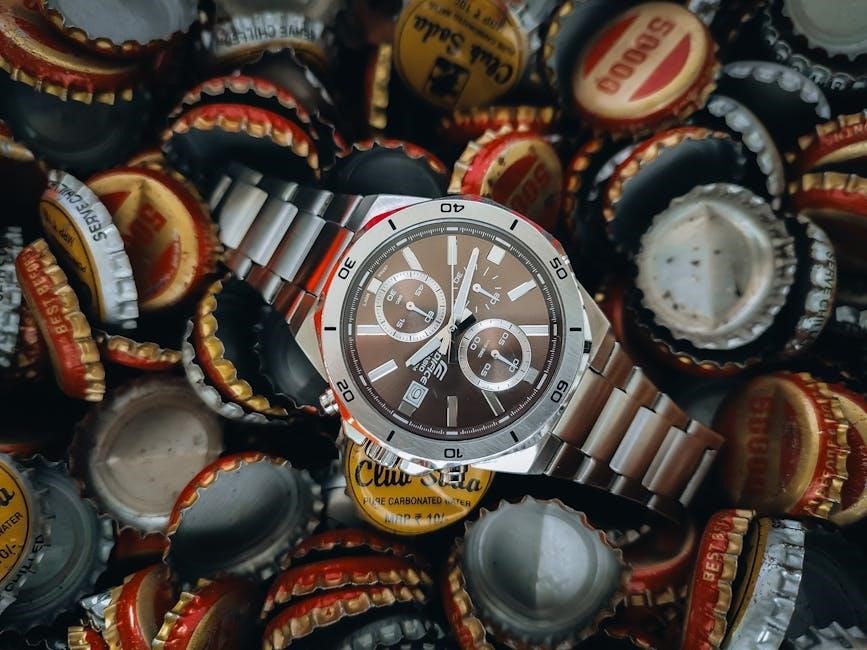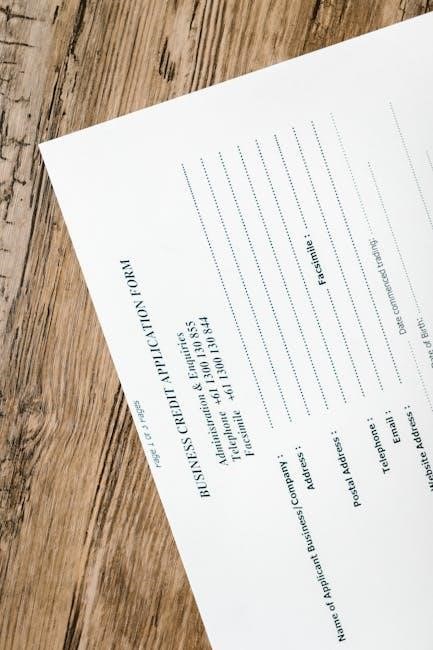A 24-hour urine collection is a diagnostic test requiring patients to collect all urine over a 24-hour period. It measures substances like creatinine and protein to assess kidney function and diagnose various health conditions, providing accurate and comprehensive results for medical evaluation.
What is a 24-Hour Urine Collection?
A 24-hour urine collection is a diagnostic procedure where patients collect all their urine over a 24-hour period. This test involves saving every drop of urine produced, from the initial morning sample to the final one the next day. The collected urine is stored in a special container, often provided by a healthcare provider, and must be kept refrigerated or on ice to preserve the sample. The process ensures accurate measurement of various substances, such as proteins, hormones, or waste products, which helps assess kidney function and diagnose potential health conditions. Proper timing and adherence to instructions are crucial for reliable results.
Why is a 24-Hour Urine Collection Necessary?
A 24-hour urine collection is a crucial diagnostic tool for assessing kidney function and detecting various health conditions. By measuring substances like protein, creatinine, and hormones over a full day, it provides a comprehensive view of how the kidneys are processing waste and excess fluids. This test is essential for diagnosing conditions such as kidney disease, diabetes, and adrenal disorders. It also helps monitor the progression of existing kidney issues and guides treatment decisions. Accurate results depend on collecting all urine during the 24-hour period, making it a vital procedure for precise medical evaluation and effective patient care.

Purpose and Importance of the Test
The 24-hour urine collection is a diagnostic tool used to assess kidney function, detect abnormalities, and monitor health conditions. It provides detailed insights into bodily processes, aiding in accurate diagnosis and treatment planning.
Measuring Kidney Function
The 24-hour urine collection is a critical tool for assessing kidney function by measuring waste products like creatinine and protein in urine. This test evaluates how effectively the kidneys filter waste and excess fluids from the blood. By analyzing the volume and composition of urine over a full day, healthcare providers can determine if kidney function is within normal ranges. Accurate results depend on proper collection and refrigeration of samples. Abnormal levels may indicate kidney disease or other conditions, making this test essential for early detection and monitoring of kidney health. It provides a comprehensive view of renal performance.
Evaluating Specific Substances in Urine
The 24-hour urine collection allows healthcare providers to measure specific substances, such as protein, creatinine, and electrolytes, in urine. This helps assess how well the kidneys are filtering waste and excess fluids. By analyzing these substances over a full day, the test provides precise measurements that cannot be obtained from a single sample. Accurate results depend on proper collection and storage of the urine. Elevated levels of certain substances may indicate kidney dysfunction, hormonal imbalances, or other health issues. This comprehensive evaluation aids in diagnosing and managing conditions like kidney disease, diabetes, or adrenal disorders. It ensures accurate and reliable data for medical decisions.
Diagnosing Health Conditions
A 24-hour urine collection is crucial for diagnosing various health conditions, such as kidney disease, diabetes, and adrenal disorders. By analyzing urine over a full day, healthcare providers can detect abnormalities in substance levels, like protein or creatinine, which may indicate kidney dysfunction. This test also helps identify hormonal imbalances, such as excess metanephrines in cases of adrenal tumors. Accurate results enable early detection and monitoring of chronic conditions, ensuring timely and appropriate treatment. The comprehensive data from this test is essential for making informed medical decisions and improving patient outcomes. It plays a key role in managing long-term health issues effectively.

Preparation for the 24-Hour Urine Collection
Preparation involves scheduling the test, obtaining a collection container, and understanding the 24-hour period. Ensure the container is clean and refrigerated during collection to maintain sample integrity and accuracy.
Scheduling the Test
Scheduling the 24-hour urine collection test is crucial for accurate results. Patients should coordinate with their healthcare provider to set a specific start time, typically in the morning. Ensure the collection container is obtained beforehand, and clarify any instructions. The test should begin after an initial morning urination, which is discarded. The collection period starts immediately after, and the final sample should be collected 24 hours later. Proper timing ensures the sample reflects a full day’s urinary output, providing reliable data for kidney function assessment and diagnosis of potential health conditions. Adhering to the schedule is essential for test accuracy.
Obtaining the Collection Container
Obtaining the correct collection container is essential for a 24-hour urine test. The container is typically a large, brown-colored jug with a tight-fitting cap to prevent leakage; It may be provided by your healthcare provider or purchased at a pharmacy. Ensure the container is clean and free from contaminants before use. If not provided, confirm the size and type with your lab to meet specific requirements. Keep the container out of reach of children and pets to avoid accidental tampering. Proper handling ensures accurate test results and maintains sample integrity throughout the collection period.
Understanding the Collection Period
The collection period for a 24-hour urine test begins with an initial urination, which is flushed, and ends with a final sample 24 hours later. Mark the start time and ensure all urine is collected during this window. The period may slightly vary, typically between 22 to 26 hours, but aim for exactly 24 hours. Plan to urinate at the same time the next day to complete the cycle. Set reminders to collect every sample, as missing any may require repeating the test. Keep the container easily accessible to avoid delays and ensure accuracy in the results. Proper timing is crucial for reliable data.
Step-by-Step Collection Process
Start by urinating and flushing it. Collect all urine for the next 24 hours in the provided container. End with a final sample at the 24-hour mark. Label the container with the end time for accuracy;
Starting the Collection
To begin, urinate and flush the sample to mark the start of the 24-hour period. Note the exact start time and discard this initial sample. Use the provided container to collect all subsequent urine samples. Ensure every drop is saved, including the final sample at the 24-hour mark. Label the container with the start and end times for accuracy. Keep the container refrigerated throughout the collection period to preserve the sample. Properly seal the container when not in use to prevent contamination. Adhere strictly to the 24-hour timeframe to ensure reliable test results.
Collecting Urine Throughout the Day
During the 24-hour period, collect all urine samples in a small, clean container and transfer them to the large collection container. Ensure every drop is saved, including during nighttime. After each use, tightly seal the container to prevent contamination. Keep the container refrigerated or on ice to maintain sample integrity. Avoid spilling or missing any samples, as this could affect test accuracy. If using a collection hat or small cup, pour the urine into the main container immediately. Stay hydrated and follow your normal routine, but remember to collect every urination without exception.
Completing the 24-Hour Cycle
At the end of the 24-hour period, urinate one last time and add this sample to the collection container. Ensure the final sample is collected precisely at the 24-hour mark to maintain accuracy. Once completed, tightly seal the container and label it with the end time. Refrigerate the container immediately if not already done and keep it chilled until transported to the lab. Double-check that all urine collected over the 24 hours has been added to the container. Proper completion ensures reliable test results for your healthcare provider to evaluate your condition effectively.

Handling and Storage of the Urine Sample
Keep the 24-hour urine collection container refrigerated or on ice throughout the collection period to preserve the sample. Ensure the container is tightly sealed to prevent leakage or contamination. Store it out of reach of children and transport it to the lab within two hours of completing the collection. Proper handling ensures accurate test results and maintains sample integrity for reliable medical evaluation.
Refrigeration Requirements
During the 24-hour urine collection, the sample must be kept refrigerated or placed on ice to maintain its integrity. Avoid freezing the urine, as this can alter test results. The container should remain tightly sealed to prevent contamination and leakage. Refrigeration helps preserve the chemical composition of the urine, ensuring accurate measurements of substances like protein, creatinine, and other analytes. If ice is used, ensure the sample does not thaw before laboratory submission. Proper refrigeration is crucial for obtaining reliable and precise test outcomes, making it a key step in the collection process.
Keeping the Container Sealed
Keeping the 24-hour urine collection container sealed is essential to prevent contamination and leakage. The container should be tightly capped whenever it is not in use to maintain sample integrity. Proper sealing ensures that no foreign substances enter the container, which could alter test results. Additionally, sealing prevents accidental spills, protecting the sample from environmental exposure. Failure to keep the container sealed may result in inaccurate laboratory findings, requiring the collection process to be repeated. Always follow the provided instructions to ensure the sample remains secure and intact throughout the collection period.
Transporting the Sample to the Lab
After completing the 24-hour urine collection, transport the sample to the lab promptly. Keep the container refrigerated or on ice during transport to maintain sample integrity. Ensure the container is tightly sealed to prevent leakage. It is crucial to deliver the sample within two hours of the last urine collection to avoid degradation of the specimen. Avoid delays, as this can affect test accuracy. If using ice, place the container in a leak-proof bag with ice packs. Handle the sample carefully to prevent spills and ensure it reaches the lab in optimal condition for analysis.

Common Mistakes to Avoid
- Forgetting to collect a sample: Missing even one urination can lead to incomplete results.
- Not refrigerating the sample: Failing to keep the urine cool can degrade the specimen.
- Missing the 24-hour window: Collecting for less or more than 24 hours affects accuracy.
Forgetting to Collect a Sample
Forgetting to collect a urine sample during the 24-hour period can lead to incomplete results, affecting the accuracy of the test. If a sample is missed, inform your healthcare provider immediately. They may require you to restart the collection process to ensure reliable data. To avoid this, set reminders or keep the collection container in a visible location. Consistency is key, as every drop of urine must be saved during the 24-hour window. Forgetting even one sample can compromise the test’s effectiveness, making it essential to stay vigilant throughout the collection period.
Not Refrigerating the Sample
Not refrigerating the urine sample during the 24-hour collection period can lead to bacterial growth and chemical changes, potentially altering test results. It is crucial to keep the collection container refrigerated or on ice throughout the process to preserve the integrity of the sample. If refrigeration is accidentally omitted, inform your healthcare provider immediately, as this may require repeating the test. Proper storage ensures accurate measurements of substances like protein, creatinine, and other analytes, which are essential for diagnosing and monitoring health conditions. Always prioritize refrigeration to maintain sample viability and reliability for laboratory analysis.
Missing the 24-Hour Window
Missing the 24-hour window can lead to incomplete or inaccurate test results, as the collection period must be precisely 24 hours to ensure reliable data. The collection should start and end at the same time, with a minimum of 22 hours and a maximum of 26 hours allowed. If you miss the window, inform your healthcare provider immediately, as this may necessitate repeating the test. Timely collection is critical for measuring substances like protein, creatinine, and electrolytes accurately. Adhering to the 24-hour timeframe is essential for obtaining precise and meaningful results for your medical evaluation.
Troubleshooting During Collection
Common issues during collection include forgetting samples, spillage, or contamination. If problems arise, inform your healthcare provider promptly to ensure accurate results and maintain test integrity.
What if You Forget to Collect a Sample?
If you forget to collect a urine sample during the 24-hour period, inform your healthcare provider immediately. Forgetting a sample can lead to inaccurate test results, as it disrupts the continuous collection process. Your provider may recommend repeating the test to ensure reliable data. To avoid this, stay organized by setting reminders or using a collection log. Missing even one sample can compromise the test’s accuracy, so prompt communication is crucial for maintaining the integrity of the results and achieving a successful collection.
Dealing with Spillage or Contamination
If spillage occurs during the 24-hour urine collection, clean the area immediately and use a new, sterile container if necessary. Contamination can occur if the container is not properly sealed or if foreign substances mix with the urine. To prevent this, ensure the container is tightly capped when not in use and avoid touching the inside of the container or lid. If contamination happens, inform your healthcare provider, as this may require repeating the test. Proper handling and storage are essential to maintain the integrity of the sample and ensure accurate test results.
Handling Delays in Laboratory Submission
If there is a delay in submitting the 24-hour urine sample to the laboratory, it is crucial to keep the container refrigerated or on ice to preserve the sample. Inform the lab about the delay as soon as possible to ensure proper handling. Prolonged delays may affect test accuracy, so timely submission is essential. If the delay exceeds the recommended timeframe, consult your healthcare provider for guidance. Maintaining communication with the lab and adhering to their instructions will help ensure reliable results for your 24-hour urine collection.

Special Considerations
Special considerations include pediatric patients, who may need assistance, and those with catheters or disabilities, requiring adapted collection methods to ensure accuracy and comfort during the 24-hour urine collection process.
Collecting Urine for Pediatric Patients

Collecting urine from pediatric patients requires special attention due to their inability to follow complex instructions. Parents or caregivers must assist, ensuring all urine is captured. For infants, a collection bag attached to the genital area may be used, while older children can urinate into a small container. The sample must be immediately transferred to the main collection container to maintain integrity. Supervision is crucial to ensure no urine is missed. Refrigeration and proper sealing of the container are essential to preserve the sample until lab submission. This method helps obtain accurate results for diagnosing pediatric conditions.
Instructions for Patients with Catheters
For patients with catheters, the 24-hour urine collection requires careful handling to ensure accuracy. Use a clean container or the provided drainage bag to collect all urine. If using a catheter, connect the drainage bag directly to the catheter to prevent contamination. Maintain proper hygiene by washing hands before handling the collection equipment. Keep the collection container refrigerated throughout the process to preserve the sample. Ensure the container is tightly sealed and submitted to the lab within two hours of completing the collection. This method helps obtain reliable results while accommodating the needs of catheter users.
Adjustments for Patients with Disabilities
For patients with disabilities, the 24-hour urine collection may require additional accommodations. Ensure the collection container is easily accessible and consider using adaptive tools if dexterity is limited. Patients with mobility challenges may need assistance from caregivers to collect and transfer samples. Clear instructions and visual aids can help individuals with cognitive impairments understand the process. Regular reminders to collect samples can be set using alarms or apps. Ensure the collection area is safe and free from tripping hazards. If physical limitations prevent independent collection, a caregiver or healthcare provider should assist to maintain accuracy and safety throughout the process.

Dietary and Lifestyle Considerations
Maintain your regular diet and fluid intake during the 24-hour urine collection. Avoid foods or medications that could alter test results unless instructed otherwise. Limit strenuous activities that may affect urine output. Stay hydrated to ensure accurate sample collection, typically drinking 6-8 glasses of fluid daily. Avoid excessive exercise or activities that could contaminate the sample. Consult your healthcare provider for specific dietary or lifestyle adjustments to ensure reliable test outcomes.
Fluid Intake During the Collection Period
It is essential to maintain adequate fluid intake during the 24-hour urine collection to ensure accurate test results. Drink plenty of fluids, typically 6-8 glasses (8 oz. each), to stay hydrated and promote consistent urine production. Avoid excessive fluid consumption that could lead to overhydration, as this may dilute the sample. Maintain your normal activity levels to prevent dehydration or excessive urine output. Consistent fluid intake helps in collecting a representative sample, which is crucial for evaluating kidney function and other health metrics. Follow your healthcare provider’s specific instructions regarding fluid intake to ensure reliable test outcomes.
Avoiding Certain Foods or Medications
Certain foods and medications can interfere with 24-hour urine collection results, so it’s important to avoid them during the test period. Foods like beets, rhubarb, and certain medications such as diuretics or vitamin C supplements may alter urine composition or color, potentially affecting test accuracy. Consult your healthcare provider for a list of specific substances to avoid. Some medications may need to be temporarily discontinued to ensure reliable results. Adhering to these guidelines helps provide accurate data for evaluating kidney function and other health metrics. Always follow your provider’s instructions to avoid contaminants and ensure precise test outcomes.
Maintaining Normal Activity Levels
Maintaining normal activity levels during the 24-hour urine collection is crucial for accurate test results. Patients should continue their usual routines, including work and exercise, unless instructed otherwise by their healthcare provider. This consistency helps ensure that the urine sample reflects typical kidney function and bodily processes. Avoiding significant changes in activity levels prevents fluctuations in urine output that could affect test outcomes. By adhering to this guideline, individuals help healthcare providers obtain reliable data for diagnosis and treatment planning.
Understanding the Test Results
The 24-hour urine collection results help assess kidney function and detect abnormalities. Healthcare providers interpret levels of substances like protein, creatinine, and electrolytes to diagnose conditions or monitor treatment effectiveness.
Interpreting Urine Volume
The 24-hour urine volume measures the total amount of urine produced in a day. Normal output typically ranges from 1.5 to 2 liters, depending on fluid intake and individual factors. Low volume may indicate dehydration or reduced kidney function, while excessive volume could suggest conditions like diabetes insipidus or overhydration. Accurate measurement is crucial for diagnosing and monitoring health issues. Discussing results with a healthcare provider ensures proper interpretation and next steps based on individual circumstances.
Key Substances Measured in the Urine
The 24-hour urine collection measures various substances to assess health. Creatinine levels indicate kidney function, as it reflects muscle metabolism waste. Protein in urine can signal kidney damage. Metanephrines are tested for adrenal tumors. Other substances like sodium, potassium, and calcium are also analyzed to evaluate bodily processes. These measurements help diagnose conditions such as kidney disease, hormonal imbalances, and metabolic disorders. Accurate results depend on proper collection and handling of the sample, ensuring reliable data for medical evaluation and treatment planning.
Normal vs. Abnormal Results
Normal results typically indicate proper kidney function and balanced substance levels. Abnormal results may suggest kidney dysfunction, hormonal imbalances, or metabolic disorders. Elevated protein levels could indicate kidney damage, while high creatinine may signal impaired filtration. Low or high levels of sodium, potassium, or calcium can also point to specific health issues. Accurate interpretation requires comparing results to established reference ranges. If abnormalities are detected, further testing or consultation with a healthcare provider is essential to determine the underlying cause and appropriate treatment. Proper sample collection is crucial for reliable and meaningful results.
Follow-Up with Healthcare Providers
After receiving test results, schedule a follow-up appointment to discuss findings and next steps. Your provider will explain results, address concerns, and recommend further actions if needed.
Scheduling a Follow-Up Appointment
Contact your healthcare provider to schedule a follow-up appointment after receiving your test results. This meeting allows your doctor to discuss the findings, explain their significance, and outline any necessary next steps. Be sure to ask questions and clarify any concerns you may have. It’s important to understand how the results impact your health and treatment plan. Schedule the appointment promptly to ensure timely care and address any potential issues early. Preparing a list of questions beforehand can help maximize the effectiveness of your visit.
Discussing Test Results
During your follow-up appointment, your healthcare provider will discuss the results of your 24-hour urine collection. They will interpret the levels of substances measured, such as creatinine or protein, and explain their significance. Abnormal results may indicate conditions like kidney dysfunction or metabolic issues. Your doctor will outline whether further testing or treatment is needed. This is an opportunity to ask questions and understand how the results impact your health. Be prepared to discuss any symptoms or concerns to ensure a comprehensive understanding of your condition and the next steps in your care plan.
Next Steps Based on Results
Based on your 24-hour urine collection results, your healthcare provider will determine the appropriate next steps. If results are normal, no further action may be needed. However, if abnormalities are detected, such as elevated protein or creatinine levels, additional testing or treatment may be recommended. This could include lifestyle changes, medication, or referrals to specialists. Your doctor will guide you on the necessary steps to address any identified issues and monitor your condition. It’s important to follow their recommendations to ensure proper management of your health and prevent potential complications.
A 24-hour urine collection is a valuable diagnostic tool for assessing kidney function and detecting health issues. Accurate results depend on following instructions carefully, ensuring reliable outcomes for effective care.
The 24-hour urine collection involves gathering all urine produced over a full day. Patients start by emptying their bladder in the morning, then collect every subsequent sample. Urine is stored in a provided container, which must be kept refrigerated or on ice to preserve the sample. The process concludes with a final collection at the same time the next morning. Proper handling, such as avoiding contamination and adhering to the 24-hour timeframe, ensures accurate test results. This method provides a comprehensive overview of kidney function and other health metrics, making it a crucial diagnostic tool for healthcare providers.
Importance of Accurate Test Results
Accurate 24-hour urine collection results are critical for diagnosing and managing health conditions. They provide precise measurements of substances like protein, creatinine, and hormones, which are essential for assessing kidney function and detecting disorders. Inaccurate results due to incomplete collection or improper handling can lead to misdiagnosis or inappropriate treatment. Ensuring every sample is collected and stored correctly guarantees reliable data, enabling healthcare providers to make informed decisions. This accuracy is vital for identifying conditions like kidney disease or hormonal imbalances, making the test a cornerstone of diagnostic care.
Final Tips for a Successful Collection
To ensure a successful 24-hour urine collection, start and end the collection at the same time, capturing every sample. Use the provided container and avoid contamination by keeping it clean. Refrigerate the container throughout the process to preserve the sample. Stay hydrated and maintain your usual diet unless instructed otherwise. Double-check that no urine is missed, as this could affect results. If issues arise, such as spills or forgotten samples, notify your healthcare provider immediately. Accurate collection is key to reliable test outcomes, so follow instructions carefully and plan ahead to avoid delays or errors.

